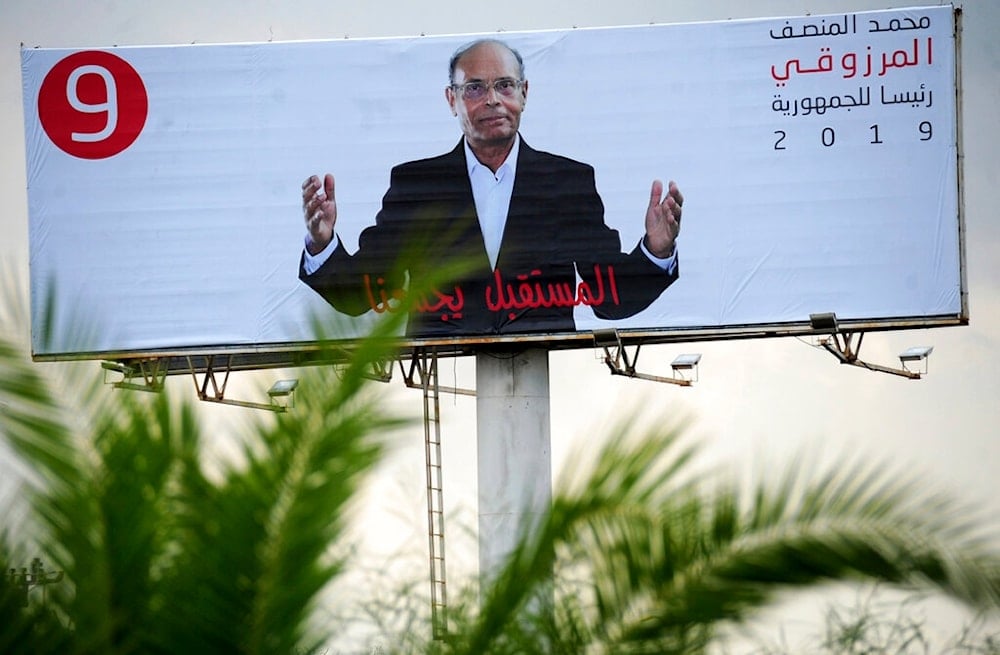Tunisian Court sentences ex-President Marzouki to 22 years in absentia
"To those judges, I say: Your rulings are void, and you are void... You will be tried. Democracy will return," the former President wrote on his social media account.
-

This September 10, 2019 file photo, shows an electoral poster for then-presidential candidate Moncef Marzouki. (AP Photo/Hassene Dridi)
A Tunisian court on Friday handed a 22-year prison sentence in absentia to former President Moncef Marzouki on charges of undermining state security. The ruling has triggered renewed concern among opposition groups and rights advocates, who denounce what they describe as a "systematic campaign" to silence critics of President Kais Saied.
Marzouki, who served as Tunisia's president from 2011 to 2014, has long been a staunch critic of Saied. He accuses the current president of dismantling Tunisia's democratic institutions after assuming sweeping powers by dissolving parliament in July 2021 and ruling by decree, moves widely condemned by civil society and international observers as a de facto coup.
Saied defended the measures as necessary to "restore stability and order" amid prolonged political deadlock and economic decline. Since then, Tunisia has seen a steady erosion of judicial independence, with dozens of judges dismissed and many more sidelined or placed under executive control.
In response to the court ruling, Marzouki wrote on his official social media page: "To those judges, I say: Your rulings are void, and you are void... You will be tried. Democracy will return."
He added that the new sentence adds to two earlier convictions—eight years and four years also issued in absentia—bringing the total to 34 years behind bars.
"The garbage judges issued a sentence of 22 years in prison against me... In their generous spirit, they handed the same verdict to Imed Daïmi and Dean Kilani as part of a surreal series of rulings targeting Tunisia's finest men—rulings that continue to provoke global ridicule," Marzouki posted on X.
#منصف_المرزوقي
— منصف المرزوقي - Moncef Marzouki (@MMarzouki01) June 21, 2025
أصدر قضاة الزبالة حكما ضدي بـ 22 سنة سجن تضاف لحكمين سابقين بـ 8 سنوات وآخر بـ 4 سنوات
الحاصل 34 سنة.
من فضل كرمهم حكموا بنفس الحكم على عماد الدايمي والعميد الكيلاني وذلك في إطار سلسلة الأحكام السريالية التي طالت خيرة رجالات #تونس ولا تزال تثير سخرية العالم.… pic.twitter.com/RX17ZkCiCT
Widening Opposition Purge
This is Marzouki's third conviction in absentia, all tied to allegations of endangering state security. His sentencing comes amid a broader crackdown that has accelerated under Saied's rule.
On the same day, another Tunisian court sentenced Sahbi Atig, a senior figure in the opposition Ennahda Party, to 15 years in prison on charges of money laundering. His lawyer dismissed the case as politically motivated, pointing to a lack of credible evidence and asserting that it was "designed to eliminate political opponents."
Read more: Protests erupt in Tunisia over arrest of prominent lawyer Ahmed Souab
The judgment against Atig adds to a string of prosecutions against political figures in recent years. In April 2025, Tunisian courts handed down sentences of up to 66 years to several opposition leaders, lawyers, and businessmen accused of conspiring against state security. The legal proceedings were widely criticized by human rights groups and opposition parties as lacking due process.
Most prominent opposition figures are now either in prison or facing charges. Among them are Abir Moussi, leader of the Free Destourian Party, who was sentenced in March 2025 to two years in prison for "insulting the electoral commission," and Rached Ghannouchi, the historic leader of the Ennahda Movement, who remains incarcerated on charges his supporters say are politically driven.
Legal experts and international observers warn that Tunisia is witnessing a dangerous regression from the democratic gains achieved after the 2011 revolution. The concentration of power in the presidency, combined with the instrumentalization of the judiciary, has raised serious concerns about the future of political pluralism in the country.

 3 Min Read
3 Min Read









